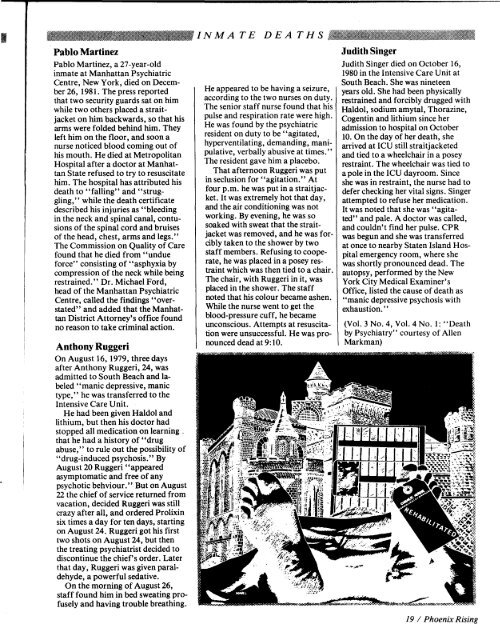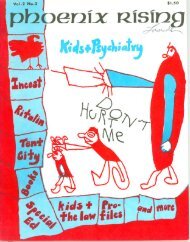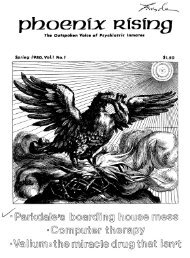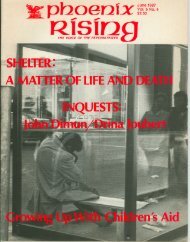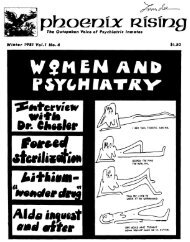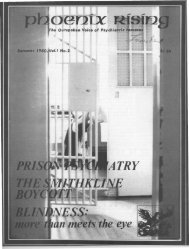Phoenix Rising - Psychiatric Survivor Archives of Toronto
Phoenix Rising - Psychiatric Survivor Archives of Toronto
Phoenix Rising - Psychiatric Survivor Archives of Toronto
You also want an ePaper? Increase the reach of your titles
YUMPU automatically turns print PDFs into web optimized ePapers that Google loves.
:~;~«*W""·M~W';'.~W~":«-S'<br />
Pablo Martinez<br />
Pablo Martinez, a 27-year-old<br />
inmate at Manhattan <strong>Psychiatric</strong><br />
Centre, New York, died on December<br />
26, 1981. The press reported<br />
that two security guards sat on him<br />
while two others placed a straitjacket<br />
on him backwards, so that his<br />
arms were folded behind him. They<br />
left him on the floor, and soon a<br />
nurse noticed blood coming out <strong>of</strong><br />
his mouth. He died at Metropolitan<br />
Hospital after a doctor at Manhattan<br />
State refused to try to resuscitate<br />
him. The hospital has attributed his<br />
death to "falling" and "struggling,"<br />
while the death certificate<br />
described his injuries as "bleeding<br />
in the neck and spinal canal, contusions<br />
<strong>of</strong> the spinal cord and bruises<br />
<strong>of</strong> the head, chest, arms and legs."<br />
The Commission on Quality <strong>of</strong> Care<br />
found that he died from "undue<br />
force" consisting <strong>of</strong> "asphyxia by<br />
compression <strong>of</strong> the neck while being<br />
restrained." Dr. Michael Ford,<br />
head <strong>of</strong> the Manhattan <strong>Psychiatric</strong><br />
Centre, called the findings "overstated"<br />
and added that the Manhattan<br />
District Attorney's <strong>of</strong>fice found<br />
no reason to take criminal action.<br />
Anthony Ruggeri<br />
On August 16, 1979, three days<br />
after Anthony Ruggeri, 24, was<br />
admitted to South Beach and labeled<br />
"manic depressive, manic<br />
type," he was transferred to the<br />
Intensive Care Unit.<br />
He had been given Haldol and<br />
lithium, but then his doctor had<br />
stopped all medication on learning .<br />
that he had a history <strong>of</strong> "drug<br />
abuse," to rule out the possibility <strong>of</strong><br />
"drug-induced psychosis." By<br />
August 20 Ruggeri "appeared<br />
asymptomatic and free <strong>of</strong> any<br />
psychotic behviour. " But on August<br />
22 the chief <strong>of</strong> service returned from<br />
vacation, decided Ruggeri was still<br />
crazy after all, and ordered Prolixin<br />
six times a day for ten days, starting<br />
on August 24. Ruggeri got his first<br />
two shots on August 24, but then<br />
the treating psychiatrist decided to<br />
discontinue the chief's order. Later<br />
that day, Ruggeri was given paraldehyde,<br />
a powerful sedative.<br />
On the morning <strong>of</strong> August 26,<br />
staff found him in bed sweating pr<strong>of</strong>usely<br />
and having trouble breathing.<br />
He appeared to be having a seizure,<br />
according to the two nurses on duty.<br />
The senior staff nurse found that his<br />
pulse and respiration rate were high.<br />
He was found by the psychiatric<br />
resident on duty to be "agitated,<br />
hyperventilating, demanding, manipulative,<br />
verbally abusive at times."<br />
The resident gave him a placebo.<br />
That afternoon Ruggeri was put<br />
in seclusion for "agitation." At<br />
four p.m. he was put in a straitjacket.<br />
It was extremely hot that day,<br />
and the air conditioning was not<br />
working. By evening, he was so<br />
soaked with sweat that the straitjacket<br />
was removed, and he was forcibly<br />
taken to the shower by two<br />
staff members. Refusing to cooperate,<br />
he was placed in a posey restraint<br />
which was then tied to a chair.<br />
The chair, with Ruggeri in it, was<br />
placed in the shower. The staff<br />
noted that his colour became ashen.<br />
While the nurse went to get the<br />
blood-pressure cuff, he became<br />
unconscious. Attempts at resuscitation<br />
were unsuccessful. He was pronounced<br />
dead at 9: 10.<br />
Judith Singer<br />
Judith Singer died on October 16,<br />
1980in the Intensive Care Unit at<br />
South Beach. She was nineteen<br />
years old. She had been physically<br />
restrained and forcibly drugged with<br />
Haldol, sodium amy tal, Thorazine,<br />
Cogentin and lithium since her<br />
admission to hospital on October<br />
10. On the day <strong>of</strong> her death, she<br />
arrived at ICU still straitjacketed<br />
and tied to a wheelchair in a posey<br />
restraint. The wheelchair was tied to<br />
a pole in the ICU dayroom. Since<br />
she was in restraint, the nurse had to<br />
defer checking her vital signs. Singer<br />
attempted to refuse her medication.<br />
It was noted that she was "agitated"<br />
and pale. A doctor was called,<br />
and couldn't find her pulse. CPR<br />
was begun and she was transferred<br />
at once to nearby Staten Island Hospital<br />
emergency room, where she<br />
was shortly pronounced dead. The<br />
autopsy, performed by the New<br />
York City Medical Examiner's<br />
Office, listed the cause <strong>of</strong> death as<br />
"manic depressive psychosis with<br />
exhaustion. "<br />
(Vol. 3 No.4, Vol. 4 No.1: "Death<br />
by Psychiatry" courtesy <strong>of</strong> Allen<br />
Markman)<br />
19 / <strong>Phoenix</strong> <strong>Rising</strong>


